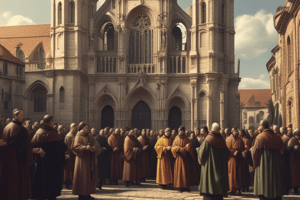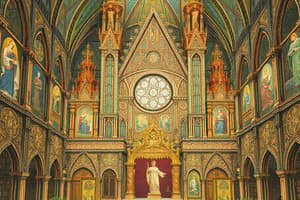Podcast
Questions and Answers
Which term best describes the behavior of some members of the clergy in the medieval Roman Catholic Church?
Which term best describes the behavior of some members of the clergy in the medieval Roman Catholic Church?
- Asceticism and humility
- Simple living and frugality
- Lavish living and indulgence (correct)
- Selflessness and sacrifice
What motivated some secular rulers to challenge the authority of the Catholic Church?
What motivated some secular rulers to challenge the authority of the Catholic Church?
- Altruistic concern for church reform
- Jealousy of the church's power (correct)
- Respect for the church's teachings
- Desire to promote religious unity
What characterized the higher clerical offices in the Catholic Church during the Middle Ages?
What characterized the higher clerical offices in the Catholic Church during the Middle Ages?
- Merit-based appointments focused on spiritual concerns
- Egalitarian distribution among different social classes
- Dominance by individuals motivated by wealth and power (correct)
- Strict adherence to ascetic principles
What was the main issue that Martin Luther had with the sale of indulgences?
What was the main issue that Martin Luther had with the sale of indulgences?
What action did Martin Luther take after drafting the Ninety-five Theses?
What action did Martin Luther take after drafting the Ninety-five Theses?
What was the outcome of the meeting in Augsburg where Martin Luther was summoned by church authorities?
What was the outcome of the meeting in Augsburg where Martin Luther was summoned by church authorities?
How did Luther's view on salvation differ from the official teachings of the Roman Catholic Church?
How did Luther's view on salvation differ from the official teachings of the Roman Catholic Church?
How did the printing press aid Martin Luther in spreading his message?
How did the printing press aid Martin Luther in spreading his message?
Flashcards are hidden until you start studying
Study Notes
Medieval Catholic Church
- Simony, defined as the buying or selling of church offices, best describes the behavior of some members of the clergy in the medieval Roman Catholic Church.
Challenges to Church Authority
- Secular rulers challenged the authority of the Catholic Church, motivated by the desire to gain control over Church lands, revenues, and appointments to high-ranking positions.
Higher Clerical Offices
- During the Middle Ages, higher clerical offices in the Catholic Church were characterized by nepotism, where offices were often purchased or inherited.
Martin Luther and Indulgences
- Martin Luther's main issue with the sale of indulgences was that they implied salvation could be bought, contradicting his belief that salvation comes from faith alone.
The Ninety-Five Theses
- After drafting the Ninety-Five Theses, Martin Luther nailed them to the door of the Castle Church in Wittenberg, sparking the Protestant Reformation.
Confrontation with Church Authorities
- When summoned by church authorities to a meeting in Augsburg, Martin Luther refused to retract his statements, leading to his excommunication.
View on Salvation
- Luther's view on salvation differed from the official teachings of the Roman Catholic Church, as he believed salvation comes through faith alone, whereas the Church taught that good works and sacraments were necessary for salvation.
The Printing Press
- The printing press aided Martin Luther in spreading his message by allowing for mass production of his writings, making them widely available and contributing to the rapid spread of his ideas.
Studying That Suits You
Use AI to generate personalized quizzes and flashcards to suit your learning preferences.




